
Friedrich Christian Anton Lang, better known as Fritz Lang, was an Austrian-American film director, screenwriter, and producer who worked in Germany and later the United States. One of the best-known émigrés from Germany's school of Expressionism, he was dubbed the "Master of Darkness" by the British Film Institute. He has been cited as one of the most influential filmmakers of all time.
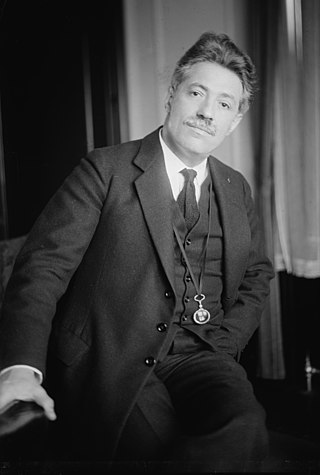
Friedrich "Fritz" Kreisler was an Austrian-born American violinist and composer. One of the most noted violin masters of his day, and regarded as one of the greatest violinists of all time, he was known for his sweet tone and expressive phrasing. Like many great violinists of his generation, he produced a characteristic sound which was immediately recognizable as his own. Although it derived in many respects from the Franco-Belgian school, his style is nonetheless reminiscent of the gemütlich (cozy) lifestyle of pre-war Vienna.
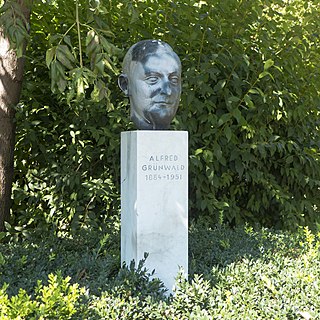
Alfred Grünwald (1884–1951) was an Austrian author, librettist, and lyricist. Some of his better-known works were written in conjunction with the composers Franz Lehár, Emmerich Kálmán, Oscar Straus, Paul Abraham, and Robert Stolz.

Ungeküsst soll man nicht schlafen gehn is a 1936 Austrian comedy film. The screenplay was written by Fritz Koselka, the title song was composed by Robert Stolz, and the film was directed by E. W. Emo. The film, shot in black and white, starred the three most popular German-speaking comedians of the time—Heinz Rühmann, Hans Moser, and Theo Lingen. The leading roles were played by Liane Haid and Annie Rosar.

Heinrich Wilhelm "Heinz" Rühmann was a German film actor who appeared in over 100 films between 1926 and 1993. He is one of the most famous and popular German actors of the 20th century, and is considered a German film legend. Rühmann is best known for playing the part of a comic ordinary citizen in film comedies such as Three from the Filling Station and The Punch Bowl. During his later years, he was also a respected character actor in films such as The Captain from Köpenick and It Happened in Broad Daylight. His only English-speaking movie was the 1965 Ship of Fools.

Karl Farkas was an Austrian actor and cabaret performer.
Fritz Schulz was a German and Austrian movie and stage actor, singer and director.
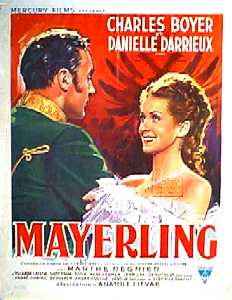
Mayerling is a 1936 French historical drama film directed by Anatole Litvak and produced by Seymour Nebenzal from a screenplay by Marcel Achard, Joseph Kessel, and Irma von Cube, based on the 1930 novel Idyll's End by Claude Anet.

Cinema of Austria refers to the film industry based in Austria. Austria has had an active cinema industry since the early 20th century when it was the Austro-Hungarian Empire, and that has continued to the present day. Producer Sascha Kolowrat-Krakowsky, producer-director-writer Luise Kolm and the Austro-Hungarian directors Michael Curtiz and Alexander Korda were among the pioneers of early Austrian cinema. Several Austrian directors pursued careers in Weimar Germany and later in the United States, among them Fritz Lang, G. W. Pabst, Josef von Sternberg, Billy Wilder, Fred Zinnemann, and Otto Preminger.
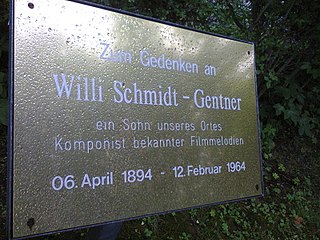
Willy Schmidt-Gentner was one of the most successful German composers of film music in the history of German-language cinema. He moved to Vienna in 1933. At his most productive, he scored up to 10 films a year, including numerous classics and masterpieces of the German and Austrian cinema.
Karl Grune was an Austrian film director and writer who made many silent films in the 1920s.

The King Steps Out is a 1936 American musical comedy film directed by Josef von Sternberg and starring Grace Moore, Franchot Tone and Walter Connolly. It is based on the early years of Empress Elisabeth of Austria, known as "Sisi" or "Sissi", and her courtship and marriage to Franz Joseph I of Austria, after he was initially engaged to her older sister Duchess Helene in Bavaria. The film is set from 1852 to 1854.

The Hound of the Baskervilles is a 1929 German silent mystery film directed by Richard Oswald and starring Carlyle Blackwell, Alexander Murski, Livio Pavanelli. The film is an adaptation of the 1902 Sherlock Holmes novel The Hound of the Baskervilles by Arthur Conan Doyle. It was the last Sherlock Holmes adaptation in the silent film era. The film boasted an unusually international cast, including American actor Carlyle Blackwell, German actor Fritz Rasp, British actress Alma Taylor, Russian actor Alexander Murski and Italian actor Livio Pavanelli.
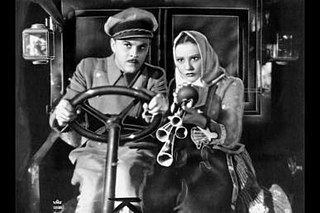
Catherine the Last is a 1936 Austrian romantic comedy film directed by Henry Koster and starring Franciska Gaal, Hans Holt and Hans Olden. It was made by the Austrian subsidiary of Universal Pictures. The film's sets were designed by the art director Erwin Scharf. After making the film, Koster moved to Hollywood] In 1938, the film was remade in America as The Girl Downstairs with Gaal reprising her role.

Victoria in Dover is a 1936 German romantic comedy film directed by Erich Engel and starring Jenny Jugo, Olga Limburg and Renée Stobrawa. It is based on a play by Geza Silberer. It was shot at the Babelsberg Studios in Potsdam and the Tempelhof Studios in Berlin and premiered at the city's Gloria-Palast. The film was remade in 1954 in Austria with Romy Schneider.
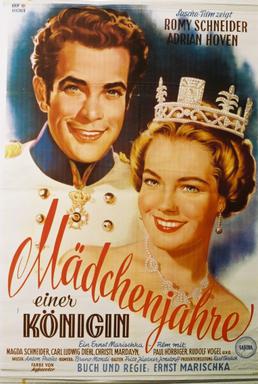
Victoria in Dover is a 1954 Austrian historical romantic comedy film directed by Ernst Marischka and starring Romy Schneider, Adrian Hoven and Magda Schneider. It is a remake of the 1936 Erich Engel film Victoria in Dover, which was based on a 1932 play by Sil-Vara. Schneider's performance as a spirited young royal was a lead-in to her best known role in Sissi and its sequels, although Marischka had originally intended to cast Sonja Ziemann as Victoria.

Sins of Man is a 1936 American period drama film directed by Otto Brower and starring Jean Hersholt, Don Ameche and Allen Jenkins. It was produced and released by 20th Century Fox. It is based on the 1930 novel Job by Joseph Roth.
Heinz Goldberg (1891–1969) was a German screenwriter. He also directed two silent films. Following the Nazi Party's rise to power in 1933, the Jewish Goldberg went into exile in several countries including Austria and the Soviet Union before settling in Britain. He returned to Germany in the 1950s.
Hans Fritz Köllner was a German screenwriter. He also directed the 1946 film Allez Hopp.
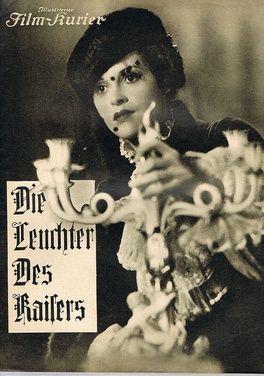
The Emperor's Candlesticks is a 1936 Austrian historical adventure film directed by Karl Hartl and starring Sybille Schmitz, Karl Ludwig Diehl and Friedl Czepa. It is an adaptation of Baroness Orczy's 1899 novel The Emperor's Candlesticks. A Hollywood film version of the story The Emperor's Candlesticks was released the following year.















